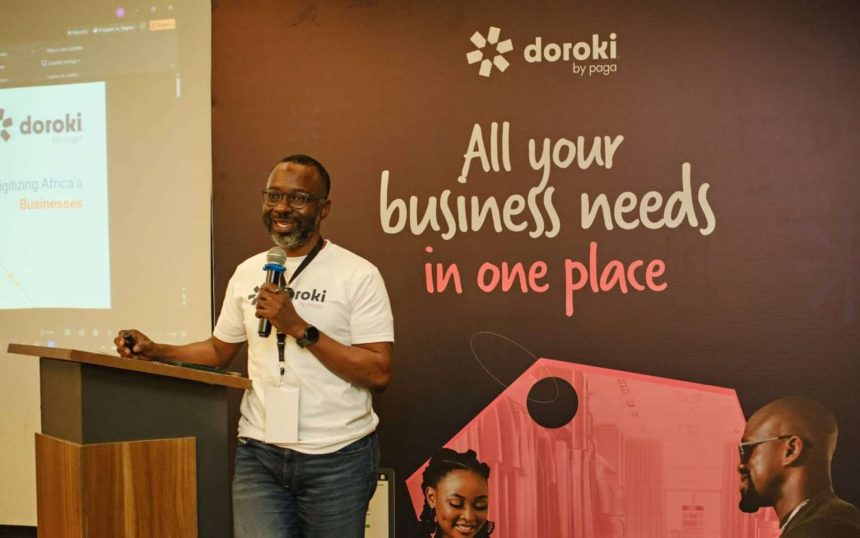As Nigeria’s SME sector continues to struggle with manual operations and fragmented tools, Paga Group, a leading African financial technology company, has just launched a new solution: Doroki.
The cloud-based business management software is designed to digitise and centralise daily operations for small and medium-sized enterprises, many of which are still operating in silos or on paper.
Although launched on June 19, 2025, at the Radisson Blu Hotel in Victoria Island, Lagos, Doroki is more than just another product release.
Paga describes the software as an all-in-one platform that consolidates key business functions, such as order management, inventory tracking, payment processing, customer engagement, and performance analytics into a single, streamlined system.
A Unified Tool for Disconnected Businesses
At its core, Doroki functions as an all-in-one operating system for small businesses. With Doroki, business owners can access a centralised dashboard that improves oversight and reduces administrative complexity.
Speaking at the unveiling, Tayo Oviosu, Founder and CEO of Paga Group, described the platform as more than just another digital tool.
“Running a business in today’s fast-paced economy is challenging – managing stock, tracking sales, reconciling payments, and keeping customers happy can feel overwhelming. Doroki changes that,” Oviosu said.
“It’s not just a tool; it’s a partner that simplifies operations, provides actionable insights, and helps businesses scale with confidence,” he added.
Arike Okunowo, General Manager of Doroki, said the platform was built to bring every aspect of a business into one unified dashboard.
“Whether it’s a restaurant owner struggling with recipe and table management or a retailer experiencing issues with stock-outs and product shelf life management (expiry dates), Doroki provides clarity, control, and confidence,” she said.
What Doroki Offers: Offline Functionality
According to the company, a key standout feature of Doroki is its offline functionality. Paga revealed that the platform can process transactions even without internet access, ensuring business continuity in areas with poor or intermittent connectivity.
The Doroki platform integrates several core business functions into a single, easy-to-use interface. Features include:
- Order Management: Automate sales and monitor fulfilment in real time.
- Inventory Tracking: Stay ahead of stock levels, expiry dates, and replenishment cycles.
- Payment Integration: Seamlessly receive payments from multiple channels.
- Customer Engagement Tools: Build loyalty through digital communication and insights.
- Analytics Dashboard: Get actionable data to support smarter decision-making.
This makes the software particularly useful for retail outlets, restaurants, and kiosks operating in suburban or rural areas, segments that are often excluded from digital transformation.
Built for the Realities of Nigerian Commerce
While many software solutions in the Nigerian market are imported for local use, Doroki is built from the ground up with local market realities in mind.
For instance, a supermarket struggling with frequent stockouts can use Doroki to monitor inventory levels in real-time, while a restaurant can manage multiple tables, orders, and recipe costings all from one interface.
The result is better forecasting, reduced waste, and ultimately, improved profitability.
A Step Forward for Nigeria’s Economic Backbone
The significance of this move cannot be overstated. With Doroki, Paga is extending its reach beyond digital payments, and simplifying payments and financial services for millions across Africa.
Industry experts believe the introduction of Doroki is a timely response to the operational challenges faced by Nigerian SMEs, many of which still rely on fragmented tools and manual processes.
By offering a centralised solution tailored to local market conditions, Doroki has the potential to improve business oversight, and empower small business owners to make data-driven decisions.
Talking Points
It is impressive that Paga has designed Doroki with offline functionality, addressing a major barrier many Nigerian businesses face, which is unreliable internet.
This single feature alone positions Doroki as a practical solution for real business challenges, especially for small retailers, restaurants, and kiosks operating in areas with poor connectivity.
At Techparley, we see how tools like this can accelerate digital transformation beyond urban centres, bringing real value to underserved communities.
The integration of sales, payments, inventory, and customer engagement into one platform means small businesses can now operate with the same efficiency as large enterprises.
However, there’s still room to expand its reach and impact. Adoption will depend on how well the platform is tailored to the daily realities of micro and informal businesses. User education, affordability, and continuous support will be key to making it stick.
As Doroki scales, we see an opportunity where exploring partnerships with trade associations, local governments, and fintech agents could accelerate onboarding and deepen its footprint across underserved regions.
With the right strategic support, Doroki has the potential to become a catalyst for digital inclusion in Nigeria’s informal economy.





